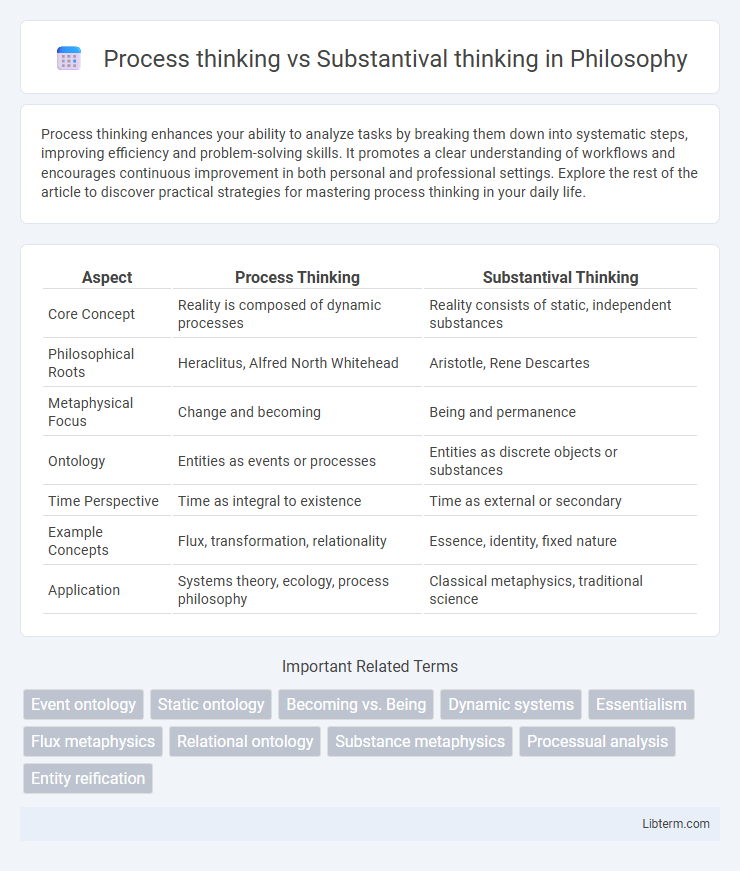Process thinking enhances your ability to analyze tasks by breaking them down into systematic steps, improving efficiency and problem-solving skills. It promotes a clear understanding of workflows and encourages continuous improvement in both personal and professional settings. Explore the rest of the article to discover practical strategies for mastering process thinking in your daily life.
Table of Comparison
| Aspect | Process Thinking | Substantival Thinking |
|---|---|---|
| Core Concept | Reality is composed of dynamic processes | Reality consists of static, independent substances |
| Philosophical Roots | Heraclitus, Alfred North Whitehead | Aristotle, Rene Descartes |
| Metaphysical Focus | Change and becoming | Being and permanence |
| Ontology | Entities as events or processes | Entities as discrete objects or substances |
| Time Perspective | Time as integral to existence | Time as external or secondary |
| Example Concepts | Flux, transformation, relationality | Essence, identity, fixed nature |
| Application | Systems theory, ecology, process philosophy | Classical metaphysics, traditional science |
Understanding Process Thinking
Process thinking emphasizes the dynamic and relational nature of reality by focusing on continuous change, interaction, and development rather than static entities. It views events and processes as fundamental, highlighting the interconnectedness and evolution of phenomena over time. Understanding process thinking enhances the ability to analyze complex systems, adaptability, and innovation in various disciplines such as biology, philosophy, and organizational theory.
Defining Substantival Thinking
Substantival thinking defines reality through fixed entities or substances that possess inherent properties independent of change or interaction. It emphasizes discrete, static objects as the fundamental units of analysis, often overlooking dynamic processes and relationships. This approach contrasts with process thinking, which prioritizes fluidity, transformation, and interdependence in understanding phenomena.
Historical Roots of Both Approaches
Process thinking originates from Heraclitus, who emphasized change and flux as fundamental to reality, influencing later philosophers like Alfred North Whitehead. Substantival thinking traces back to Aristotle, who focused on stable, independent substances as primary. These contrasting historical roots shaped divergent metaphysical frameworks in Western philosophy, framing ongoing debates on the nature of existence and identity.
Core Principles of Process Thinking
Process thinking centers on the dynamic flow of events and relationships rather than static entities, emphasizing change, interconnection, and temporal development. Core principles include viewing reality as a series of interconnected processes, prioritizing becoming over being, and understanding entities as temporary patterns within ongoing activities. This contrasts with substantival thinking, which treats objects as fixed, independent substances with inherent properties.
Key Features of Substantival Thinking
Substantival thinking centers on viewing entities as fixed, isolated, and unchanging substances with inherent properties. It emphasizes discrete objects that exist independently, focusing on static attributes rather than dynamic relationships or processes. This mindset contrasts with process thinking, which prioritizes fluidity, change, and interconnectedness in understanding reality.
Process Thinking in Modern Philosophy
Process thinking in modern philosophy emphasizes becoming, change, and relationality, contrasting with substantival thinking that centers on static entities or substances. Philosophers such as Alfred North Whitehead and Gilles Deleuze argue that reality is fundamentally constituted by processes and events rather than enduring objects. This approach influences contemporary metaphysics, ontology, and epistemology by prioritizing dynamic interactions and temporal flux over fixed essences.
Substantival Perspectives in Contemporary Context
Substantival thinking, rooted in classical metaphysics, emphasizes entities as discrete, static substances with inherent properties independent of their relationships. In contemporary contexts, this perspective shapes scientific models and legal frameworks that prioritize object permanence and fixed identities over dynamic interactions. Despite the rise of process-oriented paradigms, substantival approaches remain fundamental for structuring knowledge in disciplines like ontology, physics, and jurisprudence.
Comparative Analysis: Process vs Substantival Thinking
Process thinking emphasizes dynamic change, viewing reality as a continuous flow of events and interactions, while substantival thinking treats entities as fixed and independent substances with inherent properties. The comparative analysis reveals that process thinking better captures the complexity and interrelatedness of phenomena, making it more suitable for fields like ecology and systems theory. Substantival thinking remains valuable for classical physics and metaphysical discussions where stable, discrete objects are prioritized.
Practical Applications in Problem-Solving
Process thinking emphasizes dynamic interactions and continuous change, making it ideal for addressing complex, evolving problems in fields like project management and systems engineering. Substantival thinking prioritizes static entities and discrete components, which suits structured problem-solving approaches in areas such as product design and quality control. Integrating both perspectives enhances flexibility and precision when developing solutions in multidisciplinary and adaptive environments.
Choosing the Right Approach for Complex Systems
Process thinking emphasizes dynamic interactions and continual change within complex systems, highlighting how processes and relationships evolve over time. Substantival thinking focuses on static entities and their inherent properties, offering clarity in defining system components but potentially overlooking their fluid interdependencies. Selecting the appropriate approach requires evaluating system complexity and the need for adaptability, with process thinking better suited for systems characterized by constant flux and emergent behaviors.
Process thinking Infographic

 libterm.com
libterm.com